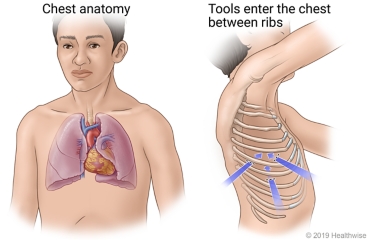Video-Assisted Thoracoscopic Surgery (VATS): Before Your Child's Surgery

What is VATS?
VATS is a way to do surgery inside the chest. With open surgery, the doctor makes one large cut in your child's chest. But with VATS, the doctor makes several small cuts. VATS also differs from open surgery because the doctor doesn't have to cut through the ribs or breastbone (sternum). The doctor may use VATS to find and treat problems with the lungs, heart, or spine. Or the doctor may use it to operate on other organs in your child's chest.
To start, the doctor will make several small cuts between your child's ribs. These cuts are called incisions. The doctor will put a thin, lighted tube with a camera on it into the chest. This tube is called a thoracoscope, or scope. It lets the doctor see inside your child's chest. Then the doctor will use tiny surgical tools to do the surgery. The doctor will close the incisions with stitches or staples.
How long your child stays in the hospital and how long it takes him or her to recover will depend on why your child is having the surgery.
The scars from the incisions will fade with time. The area around the cuts may ache or feel numb in the weeks after surgery.
How do you prepare for surgery?
Surgery can be stressful for both your child and you. This information will help you understand what you can expect. And it will help you safely prepare for your child's surgery.
 Preparing for surgery
Preparing for surgery
- Talk to your child about the surgery. Healthcare providers know how to take care of children. They will do all they can to make it easier for your child.
- Plan for your child's recovery time. Your child may need more of your time right after the surgery, both for care and for comfort.
- Understand exactly what surgery is planned, along with the risks, benefits, and other options.
- Tell the doctor ALL the medicines and natural health products your child takes. Some may increase the risk of problems during the surgery. Your doctor will tell you if your child should stop taking any of them before the surgery and how soon to do it.
The day before surgery
- A nurse may call you (or you may need to call the hospital). This is to confirm the time and date of your child's surgery and answer any questions.
- Remember to follow your doctor's instructions about your child taking or stopping medicines before surgery. This includes over-the-counter medicines.
What happens on the day of surgery?
- Follow the instructions exactly about when your child should stop eating and drinking. If you don't, the procedure may be cancelled. If your doctor told you to have your child take any medicines on the day of the procedure, have your child take them with only a sip of water.
- Follow the doctor's instructions about when your child should bathe or shower before the procedure. Do not apply lotion or deodorant.
- Your child may brush their teeth. But tell your child not to swallow any toothpaste or water.
- Do not let your child wear contact lenses. Bring your child's glasses or contact lens case.
- Be sure your child has something that's a reminder of home. A special stuffed animal, toy, or blanket may be comforting. For an older child, it might be a book or music.
At the hospital
- A parent or legal guardian must accompany your child.
- Your child will be kept comfortable and safe by the anesthesia provider. Your child will be asleep during the surgery.
- The surgery will take about 1 to 3 hours. How long it takes depends on the condition being treated.
- After surgery, your child will be taken to the recovery room. As your child wakes up, the recovery staff will monitor your child's condition. The doctor will talk to you about the surgery.
When should you call your doctor?
- You have questions or concerns.
- You don't understand how to prepare your child for surgery.
- Your child becomes ill before the surgery (such as fever, flu, or a cold).
- You need to reschedule or have changed your mind about your child having the surgery.
Adaptation Date: 06/12/2023
Adapted By: Alberta Health Services
Adaptation Reviewed By: Alberta Health Services
